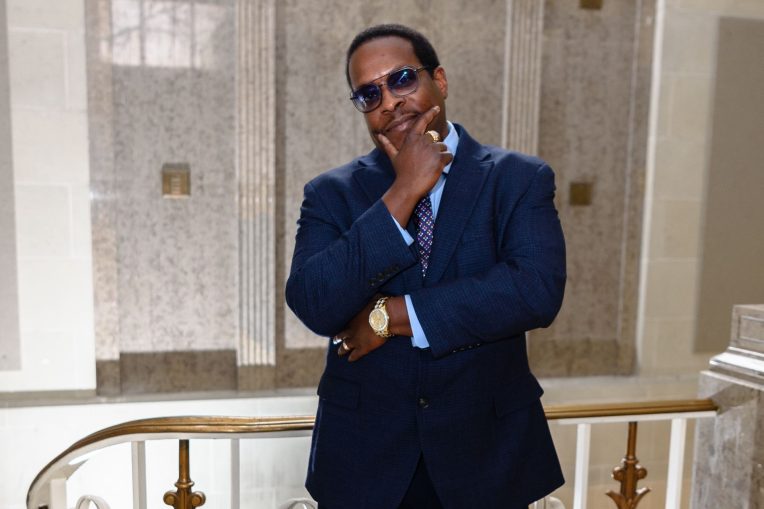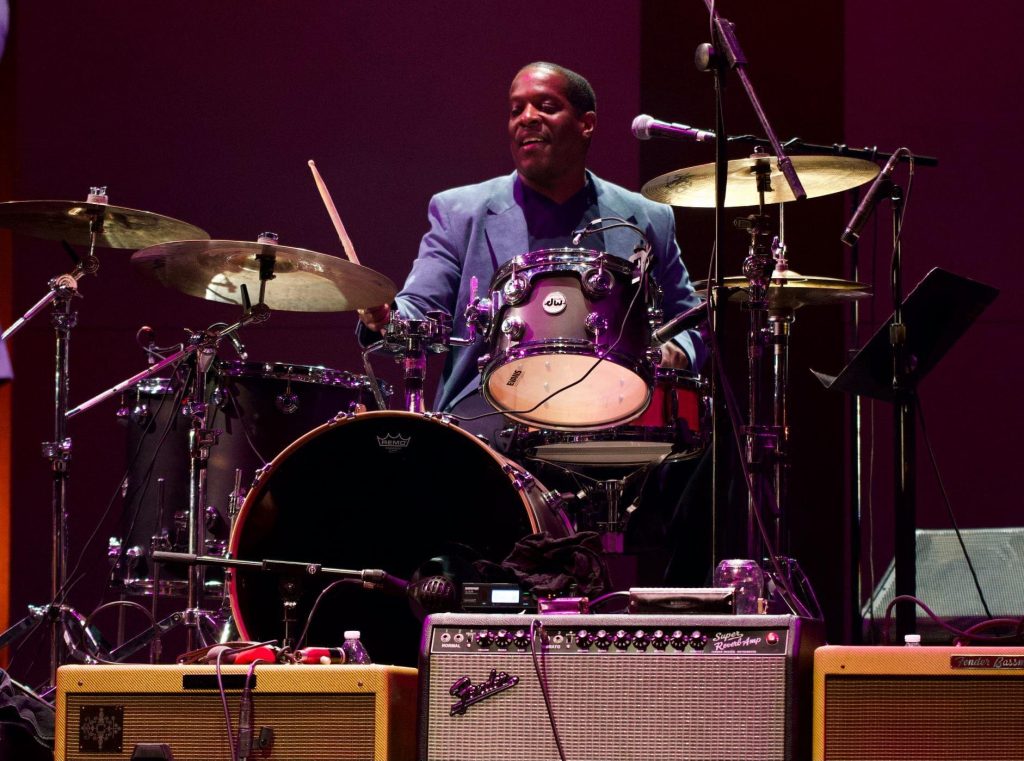For more than two decades, professional blues drummer Andrew “Blaze” Thomas has given music a pulse through his precise percussion and rhythm. Now, as an Illinois State University history graduate student, Thomas is shifting his focus to amplifying history.
Thomas, the chair of the Bloomington-Normal Black History Project (BNBHP), is giving a voice to the history of local, Black musicians. He has scoured the extensive BNBHP collection—with oral histories dating back to 1982—and he has conducted his own interviews with members of the local music community, always asking, “Who should I interview next?”
“Bloomington-Normal has this rich community of accomplished Black musicians,” Thomas said. He is compiling narratives for an essay, which he hopes to eventually expand into a book. Thomas plans to profile vocalist Jack Waddell and keyboardist Delmar Brown, among other prominent Black musicians who achieved international acclaim.
Thomas said he felt a particular connection with Waddell’s story. A Bloomington native and 1963 graduate of Illinois Wesleyan University, Waddell became an internationally renowned opera singer whose 50-year-career spanned the globe. Waddell, 81, now lives in Normal and will perform Journey to Freedom, the story of escaped slave and Underground Railroad station master John W. Jones, Saturday, February 25, at 2 p.m. in Illinois State’s Capen Auditorium.
“I read in his biography that he told his friends that he was going to become an opera singer, and they laughed at him,” Thomas said. “During that time, there weren’t Black opera singers, and there are barely any now—so you would think that he’s joking. There wasn’t anyone for him to mirror his career after.”
Yet Waddell pursued and achieved his dream, much like Thomas.
“I’m partial to him because my friends laughed at me when I told them that I was going to become a pro drummer,” Thomas said. Like Waddell, Thomas’ music career took him around the world for tours with Blues Hall of Fame inductee Billy Branch and the Sons of Blues, Bernard Allison, and Ana Popovic, among many others. He’s even played with blues legend Buddy Guy.
Born and raised on the west side of Chicago, Thomas has always been passionate about drumming. From the moment he could crawl, he would inch his way into his family’s kitchen where he would pull out pots and pans, find a big spoon, and start banging.
“My dad would pick me up, and I’d cry,” Thomas said. “When he put me back down, I’d start pounding again. So, my parents knew I was going to be a drummer.”
For his ninth birthday, Thomas’ mother bought him a shiny, white Pearl drum kit. It was love at first sight.
“Still to this day I remember that feeling,” Thomas said. “I played those drums for a long time—into the first few years of my career.”
Thomas’ first paid gig started when he was 13 years old with a local church choir. At age 16, his drumming was featured on the choir’s record.
“It kept me active and gave me some responsibilities,” Thomas said. “When I would come home from school, I would do my homework first, and then I would practice my instrument. And that really kept me grounded.”
After earning a bachelor’s degree from Western Illinois University in 2002, Thomas returned to Chicago where he became a substitute teacher during the day and an aspiring drummer at night. He practiced his craft extensively and took every opportunity possible to play open mic nights at local music clubs.
“Chicago is a great town for music,” Thomas said. “You can play every style of music any night in Chicago.”
Thomas was drawn to blues, a genre of music that tells the story of “the struggle of Black people in the United State,” Thomas said in a 2021 interview with Living Blues magazine.
To become a great blues drummer, Thomas practiced a lot—at least four hours every day. “You have to do a lot of practicing because you’re working four limbs at the same time,” Thomas said.
In 2003, Thomas landed his first road gig. He toured extensively for 17 years, while also playing on records and making TV appearances, until the coronavirus (COVID-19) pandemic halted live music.
Then, in the summer of 2020, Thomas watched with the world as George Floyd was murdered by a Minneapolis police officer. Thomas felt saddened and angered as he reflected on his own childhood of being intimidated and chased without cause by undercover police officers in unmarked vehicles who frequented his neighborhood.
“It was terrifying,” Thomas said. “When I saw George Floyd get murdered, I wanted to know the history. ‘Why is this happening?’”
Thomas found a recording on YouTube from a 1968 panel featuring Dr. Angela Davis, Dr. Huey P. Newton, and other scholars discussing police brutality and civil rights.
“It sounded like they were talking in the present,” Thomas said. “The same things they were talking about in 1968—it sounded like they were talking about 2020.”
While watching the recording, Thomas noticed that all the panelists had doctorate degrees. And so, he decided in that moment that he too would earn a Ph.D. to be better equipped to understand and communicate the history of being Black in America.
Thomas enrolled in Illinois State’s history graduate program where he has researched the histories of the Atlantic slave trade and the African diaspora beyond North America. A graduate assistant for the African American Studies program, Thomas has also collaborated on oral history projects with Professor of History Dr. Kyle Ciani.
Now in his final semester of graduate school, Thomas is writing a thesis focused on the marginalization of Black blues artists by white music industry gatekeepers, such as concert promoters and owners of record labels and blues clubs. His research includes oral histories with Black blues musicians who he knows through decades of gigging.
After graduating from Illinois State this spring, Thomas will pursue a Ph.D., and he plans to eventually develop a curriculum for blues education, “a unique African American experience,” according to Thomas.
He also hopes his research on the history of Black musicians from Bloomington-Normal will impact aspiring musicians.
“I get to do the action of history, instead of just reading about history,” Thomas said. “If I was born and raised in Bloomington-Normal and I was into music, I would probably think that I had to go to a big city like Chicago or St. Louis to play. But, if I found out that there were guys from right here in my hometown who traveled the world and did amazing things, it might push me further.
“I’m hoping that this work could inspire some kids.”



